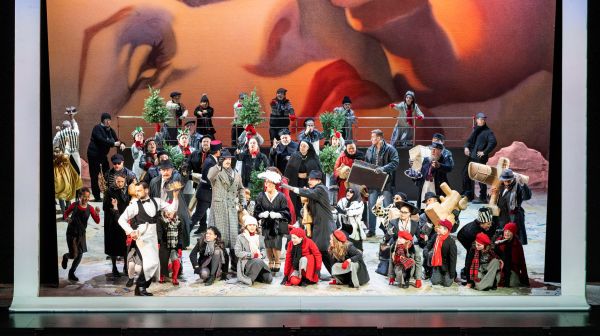Phyllida Lloyd’s production of La Bohème for Opera North is over 32 years old but still feels young. And for its audiences it still has the ability to capture – as the opera is designed to – the experience of youthful love and separation, its ecstasy and its heartbreak.
It's set in the 1950s or early 1960s, rather than the 19th century. But in some respects it takes its cue from the stories that Puccini and his collaborators used as their source material, Henry Murger’s Scènes de la vie de bohème, and the format they created from them. What we see are literally scenes – tableaux – with intervening narrative left to our imagination. Boy meets girl… there’s some backstory involving his friends and the love life of one in particular… it all goes sour… there’s a tragic death.
When the opera was first made from Murger’s mid-century novel, the 1830s of the original setting would have seemed a world you could imagine your parents might have lived in. And in this production that’s possible, at least for some of us, now – though probably truer when the production was new in 1993 than in 2025. It’s still a telling moment when the money in the electricity meter runs out in the Parisian garret and the lights fade, to the accompaniment of slow descending glissandi in the orchestral strings!
As part of their updating, Phyllida Lloyd and designer Anthony Ward took inspiration from the real romantic fiction of their new time-setting: film. It fits both concepts that everything’s framed by a kind of cinema screen-edge, and as some scenes merge to others there are the equivalents of cinematic cuts to close-up, created through lighting and projections.
Each time I see it I feel they’ve done some tweaking to freshen it up, and they have again – the revival director is James Hurley. For one thing, I don’t remember Parpignol the toy seller (Kamil Bien) previously making an appearance from one of the audience boxes in the grand circle, as well as roller-skating on the stage. It’s all a lot of fun, with the outdoor Christmas scenes depicted on a stage packed with life, colour and movement, the children of the Opera North Youth Company giving it even more gusto than their adult colleagues of the Chorus (though they are their ever-effervescent selves, pictured below).  Musically the gusto is apparent from the start. Garry Walker, the company’s music director, conducts and gives a masterclass in performing Puccini. The initial sound from the pit is bold and brash, he sets off at a cracking pace and the energy doesn’t let up for much of the first Act. He’s a master of the romantic arias, too, giving the singers the flexibility to enjoy their big moments, and also bringing more tenderness to the later musical narrative, with a sense of the score’s evolution from careless abandon to tragic outcome.
Musically the gusto is apparent from the start. Garry Walker, the company’s music director, conducts and gives a masterclass in performing Puccini. The initial sound from the pit is bold and brash, he sets off at a cracking pace and the energy doesn’t let up for much of the first Act. He’s a master of the romantic arias, too, giving the singers the flexibility to enjoy their big moments, and also bringing more tenderness to the later musical narrative, with a sense of the score’s evolution from careless abandon to tragic outcome.
This revival is double-cast for Rodolfo, Mimì and Musetta again, and I’ve seen only one performer in each role, but the trio on press night embodied their characters with accuracy – idealistic and eager for love in the case of the first two, the poet and the consumptive paper flower seller, and harder-edged, with the self-assurance of experience, as the latter reveals herself. Anthony Ciaramitaro is a tenor making an impact at the beginning of his career and can nail the top notes with the best of them: he has no problem with topping out the full orchestral sound spectrum, and he’s also believable as a young man with much to learn of real life. Olivia Boen is pretty close to an ideal Mimì – petite, alert, using her eyes to show her feelings, and carrying the familiar arias with sweet, pure tone (I liked her little nervous laugh as Ciaramitaro began his "Che gelida manina", and her body language in the "O soave fanciulla" duet). Elin Pritchard’s Musetta has been seen at Opera Holland Park and English National Opera and doesn’t disappoint in this interpretation.
Marcello is Yuriy Yurchuk, returning to the role he sang for Opera North six years ago – his baritone has a blendable quality that works well in this piece’s ensembles, and he carries the part with devil-may-care assurance rather than the fierce jealousy that some of his predecessors have created in it. Jeremy Peaker returns, again with clever characterization, to being the witless sugar-daddy Alcindoro.
Colline is Han Kim, and Schaunard is Seán Boylan: they’re young, vocally well contrasted and able to enjoy the high jinks provided by this production.
If there’s one slight regret it’s that Act Three hasn’t all the atmosphere that it’s been given in the past: Rodolfo’s change from self-assured male to confessing his real feelings is well done, but it’s not obvious how much Mimì hears of what he says, and the combustible relationship of Marcello and Musetta doesn’t catch fire as it has sometimes. But the final scene had real pathos – and, more than that, becomes the opportunity for some very beautiful balancing of tender orchestral textures under Garry Walker’s hands.















Add comment